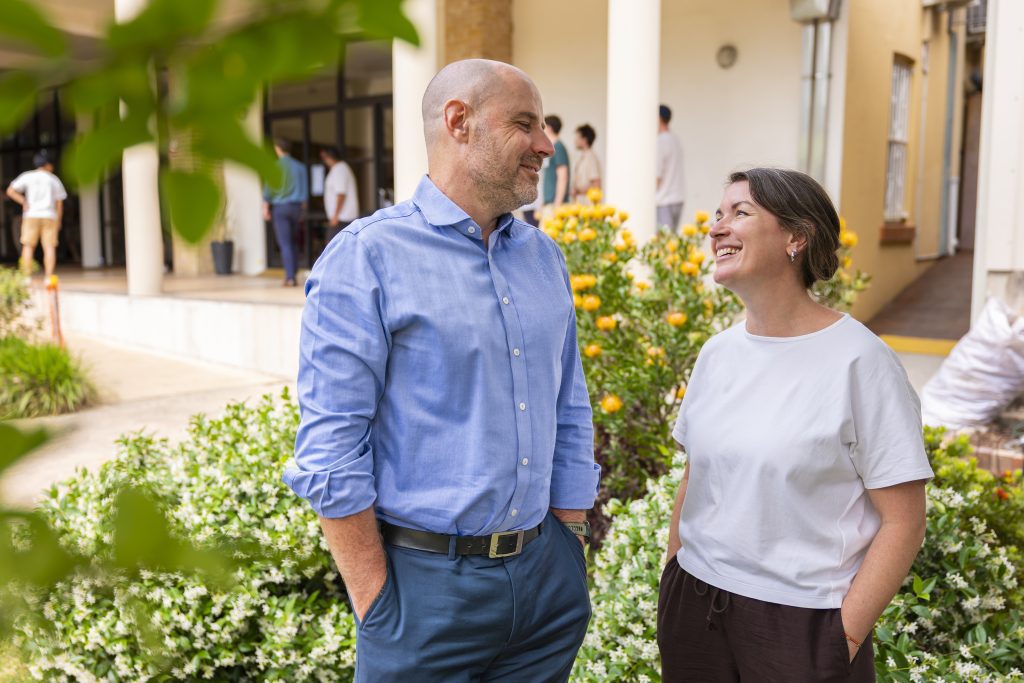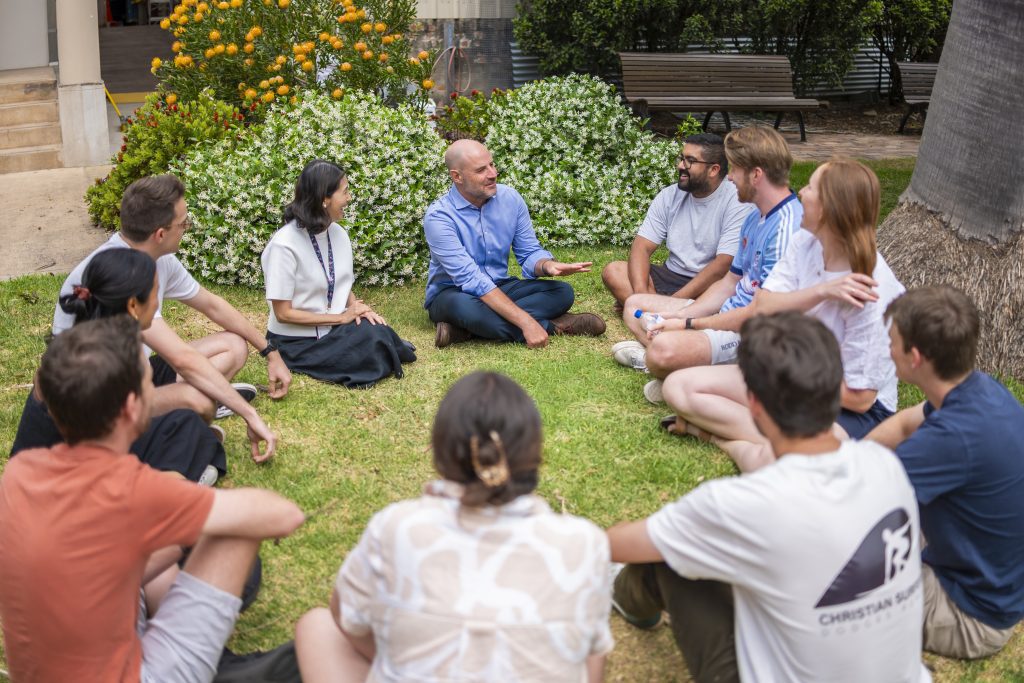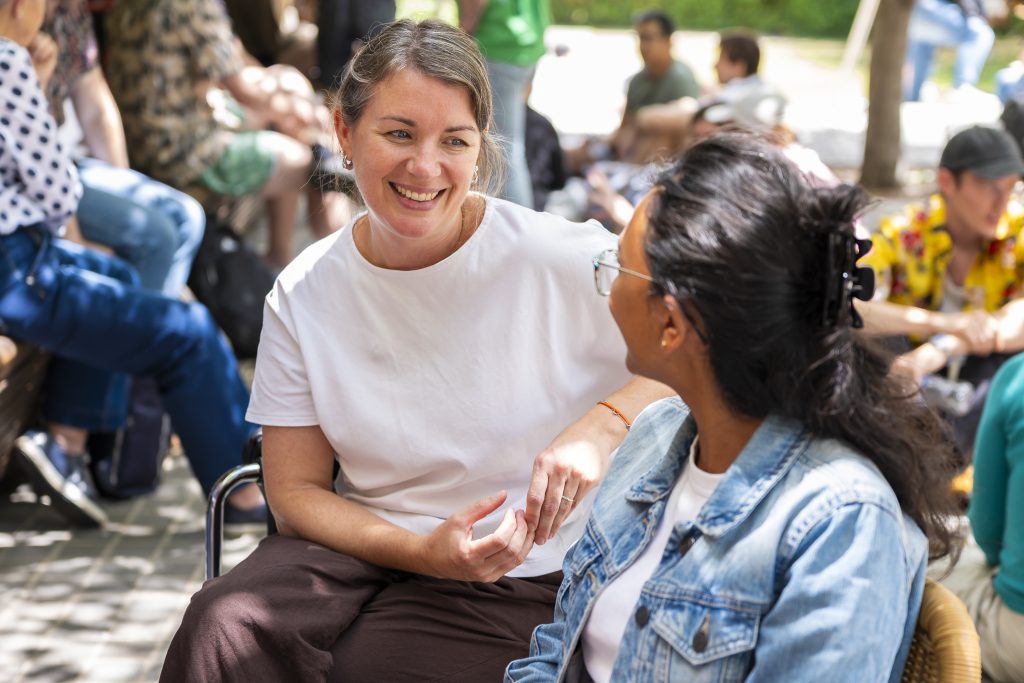(Reflections from Josh & Susannah Apieczonek’s talk “From Mount Druitt to Mont Blanc: Serving the Lord in the secular heartland of France”)
Meet the Apieczoneks

Josh and Susannah Apieczonek have long been connected to Moore College. Josh, now the incoming Head of Mission and Lecturer in Mission, completed a Bachelor of Divinity and Diploma of Ministry in 2004, and Susannah studied at the College in 2008. Before moving to France, Josh taught Christian Studies and served as a chaplain at St Andrew’s Cathedral School, Sydney.
Together, they have spent the past decade serving with CMS in Lyon, France, in student and church ministry, particularly among university students and in church planting. Their ministry has centred on helping people encounter Jesus through hospitality, community, and patient gospel witness. Susannah’s background in French language and culture has helped them engage deeply in cross-cultural life and mission. Josh and Susannah have continued to serve the French people while raising their three children, Zali, Reuben, and Heidi.
They are known for their down-to-earth warmth and love for deep, personal conversations, whether about life, faith, or someone’s journey toward Christ. We are deeply thankful to Josh and Susannah for their time, generosity, and encouragement during their visit. During their week as Missionaries in Residence, they spent time engaging with students in classes and over meals, shared a seminar “From Mount Druitt to Mont Blanc: Serving the Lord in the secular heartland of France, and met one-on-one with students to discuss mission and life in ministry. They reminded us of the beauty and challenge of living for Christ in a secular age, as well as the quiet power of presence, hospitality, and patient witness in making the gospel visible.

Life in Separate Circles
If you have ever felt like your life is a set of non-overlapping bubbles, work here, sport there, church on Sundays, neighbours somewhere else, you are not alone. Josh and Susannah Apieczonek reflected that this kind of compartmentalisation has become sadly normal in Western life. It is not how we were made to live, but it has quietly shaped how we see the world. This is one reason many Christians feel held back from sharing the gospel: our worlds rarely intersect, our schedules are full, and our instincts are shaped by a culture that prizes the here and now over the eternal.
The “Immanent Frame” (and Why It Matters)
Drawing on the work of Canadian philosopher Charles Taylor, Josh described the West as living within an immanent frame, much like a picture frame that keeps our focus within what is tangible and immediate. Heaven, judgment, and eternity do not seem to “count” in day-to-day life. In this world, happiness and self-expression are paramount, and discussions of the spiritual often feel awkward.
That is not the case everywhere. Many cultures still keep religion at the centre of public life. But in places like Australia and France, faith is often treated as a private weekend hobby. Most would not even call themselves “atheist” or “secular,” but simply “just a regular person.” It sounds ordinary, but beneath that ordinariness lies a quiet loss of meaning, life flattened to the present and eternity forgotten. It echoes Jesus’ warning: “What good is it for someone to gain the whole world, yet forfeit their soul?” (Mark 8:36)
Modern life offers speed, choice, and control, yet often leaves people breathless and anxious. We have traded meaning for mastery, and the mastery is exhausting us. Still, the longing leaks out: the boom in mindfulness, minimalism, and “meaning” literature shows people are searching, even if they do not know for what.
How We Got Here (in Brief)
– Industrialisation & Urbanisation moved people from tight communities into fragmented city life.
– Technology & Convenience promised control and comfort, but reshaped our habits. “We shape our tools, then our tools shape us.”
– Individualism & Secularisation centred authority in the expressive self.
The result? Many now live as if God is irrelevant, and Christian belief seems less “plausible” in public life. And yet, even in this kind of world, God is still at work, quietly, persistently, and powerfully. The gospel continues to take root in unexpected places, reminding us that no culture or heart is beyond His reach.
Evangelism in This World: Lessons from France
In France, Christian student groups are small and often invisible; many people have no category for an ordinary, thoughtful Christian. Yet Josh and Susannah found that the slow, hospitable way of Jesus bears fruit:
– Play the long game. Conversations unfold over months and years; measure success by the next conversation, not conversion.
– Mix the bubbles. Do not add more to your schedule; invite friends into what you already love, such as meals, studying, sports, or a café.
– Lead with stories and questions. Ask, “What is your family’s story with faith?” or “What does Easter mean for you?” Story first; categories later; that is, focus on personal experience before introducing theological concepts.
– Offer a different pace. Jesus wasn’t hurried; an unhurried presence is compelling.
– Church as a plausibility structure. Communities that pray, welcome, and rest in Christ make the gospel credible and visible.

Hope and Orientation
Hostility takes many forms in France, such as cold indifference; in Australia, it is often a matter of contested visibility. Either way, indifference can be as formidable as opposition. Yet there are signs of openness: people curious about prayer, meaning, and baptism. The cultural ground may be shifting, but the Lord remains unshaken. He still gives rest (Matthew 11:28) even as He calls us to take up our cross (Luke 9:23).
Paul summarised cultures in a word: “Jews demand signs and Greeks seek wisdom,” yet he preached Christ crucified as God’s power and wisdom (1 Corinthians 1:22-24). That pattern still helps. Name what your neighbours seek: happiness, authenticity, control and hold out Christ, who fulfils human longings without flattering our idols.
Practical Steps
1. Merge, don’t multiply – invite others into what you already do.
2. Ask story-first questions – about life or faith.
3. Practice unhurried presence -leave margin for interruption.
4. Pray specifically – ask the Lord for one crossed-over bubble this month.
5. Host simply – a warm table beats a perfect one.
References
Josh, Susannah Apieczonek,. From Mount Druitt to Mont Blanc: Serving the Lord in the Secular Heartland of France. Talk presented as part of the Missionaries in Residence program, Moore Theological College, Sydney, 2025.
Concepts referencing the “immanent frame” are drawn from Charles Taylor, A Secular Age (Cambridge, MA: Harvard University Press, 2007), as discussed in the above talk.
Read more . . .



